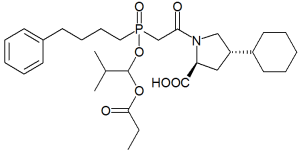Fosinopril
Fosinopril is an angiotensin converting enzyme (ACE) inhibitor used for the treatment of hypertension and some types of chronic heart failure. Fosinopril is the first and only phosphonate-containing ACE inhibitor marketed. It is marketed by Bristol-Myers Squibb under the trade name Monopril®. more...
Development
The development of fosinopril started from the observation of the hypotensive effects of phosphoramidon, an extract from the bacterium Streptomyces tanashiensis. Phosphoramidon was found to be a potent inhibitor of ACE. It was speculated that the phosphoramide moiety in the molecule was central to its inhibition of ACE. Further studies found that the phosphoramide moiety served the dual-purpose of interacting with the Zn2+ in ACE, as well as mimicking the transition-state of the natural substrate of ACE.
These discoveries led to the attempt to develop a new group of ACE inhibitors which contained the phosphoramide moiety. The initial lead proved to be very potent but unstable at physiological pH. Later compounds would have a phosphonate moiety (being more stable) in place of the phosphoramide. The lessons learnt in the development of enalapril and later ACE inhibitors were applied to the design and eventually fosinoprilat was developed.
Fosinoprilat and Fosinopril
Fosinoprilat proved to have the same problem as enalaprilat and the other carboxylate-containing ACE inhibitors (namely poor oral bioavailability). The solution, fortunately, was very similar - the addition of a hydrophobic side-chain to modulate the ionisation characteristics of the molecule. Thus fosinopril was developed. Fosinopril is administered as a prodrug and is converted in vivo to the active form fosinoprilat.
Read more at Wikipedia.org



